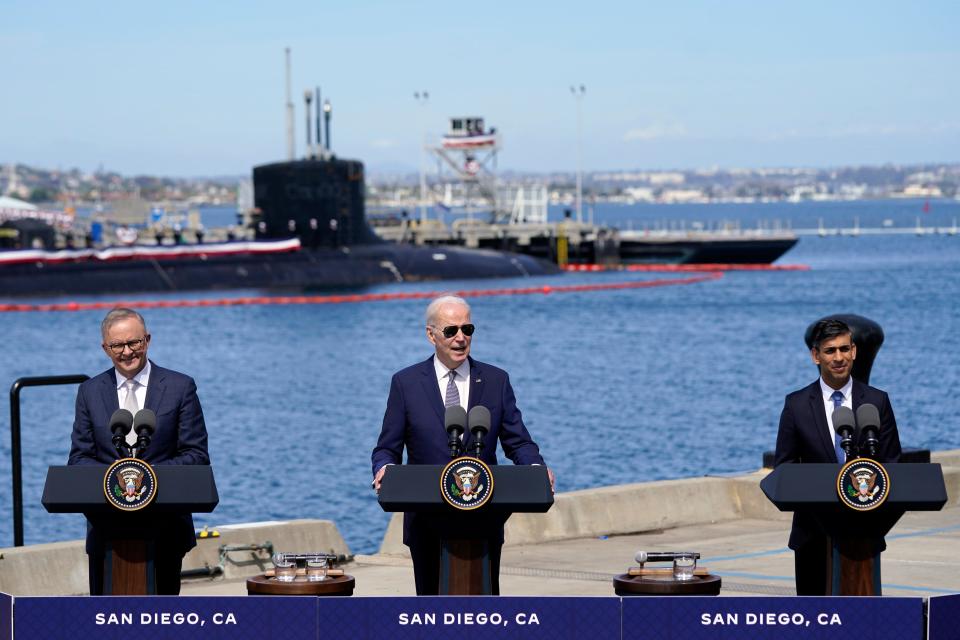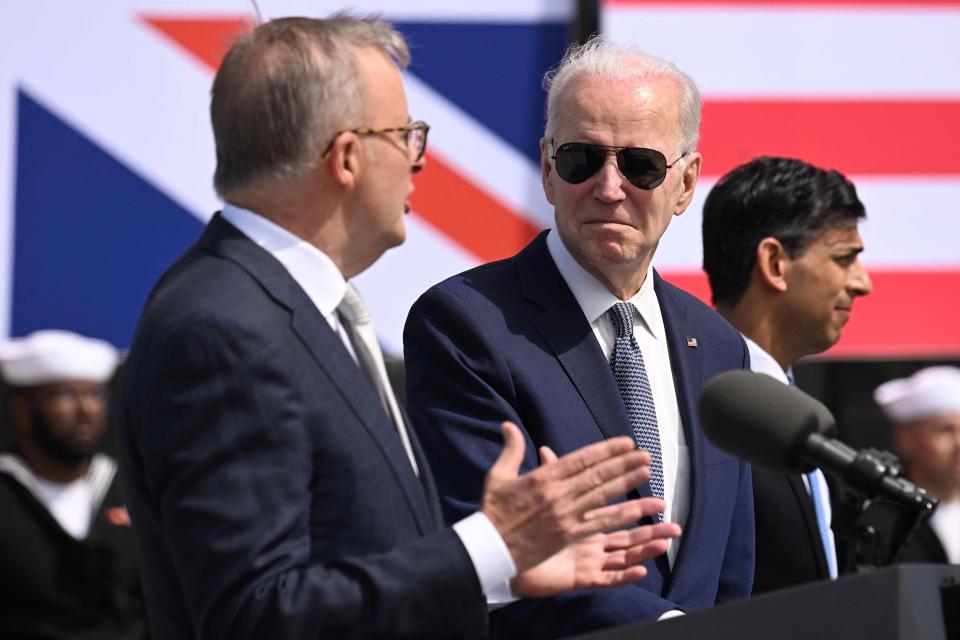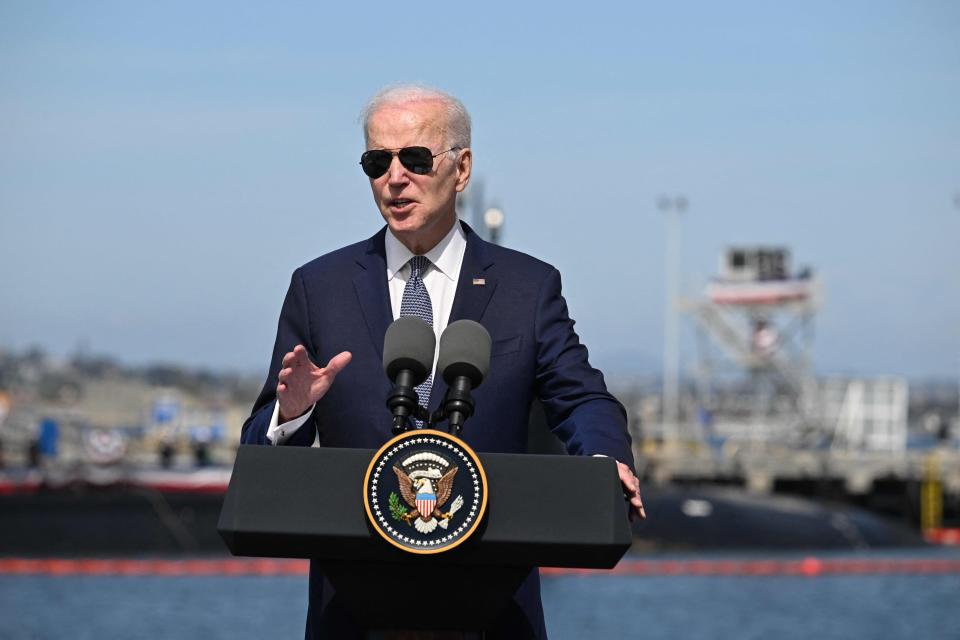Biden announces Australian nuclear-powered submarine deal to counter China’s growing influence
The United States will spend billions of dollars expanding its ability to produce nuclear-powered attack submarines as part of a landmark security deal with Australia and the United Kingdom that President Joe Biden detailed Monday.
The announcement, made at a naval base in San Diego with the leaders of the three nations, came 18 months after the creation of the AUKUS partnership to counter China’s growing influence in the Indo-Pacific region.
The deal will provide Australia with nuclear-powered attack submarines, which can stay underwater longer than conventionally powered ones and are harder to detect.
Pending approval from Congress, the U.S. will sell at least three – and as many as five – Virginia-class submarines to Australia once its navy is trained and ready to receive them.
In later years, the United Kingdom and Australia will build their own advanced-technology boats with U.S. help.
“The United States could ask for no better partners in the Indo-Pacific where so much of our shared future will be written,” Biden said from a pier near two U.S. submarines and a flag-adorned destroyer. "I'm proud to be your shipmates."
Stay in the conversation on politics: Sign up for the OnPolitics newsletter
To carry out that plan, the U.S. and Britain have to expand their submarine production capabilities and Australia must build its own.
The question is whether the submarines can be built fast enough to be enough of a deterrent to China, said Charles Edel, an expert on the Indo-Pacific region at the Center for Strategic and International Studies. The Navy is already behind in production for its own submarine needs because of backlogs, maintenance problems and disruptions from COVID-19, he said.
"This looks like it will be an extraordinarily ambitious program," Edel said during a public discussion of the initiative Friday. "But for those ambitions to be realized, the three governments need to match their resources to their aims, look to the budgets and the level of bipartisan support this initiative has in each of the three countries."

The latest
The U.S. is spending $4.6 billion over the next five years to increase submarine construction capacity and improve maintenance capabilities. More may be needed.
Australia is making what the White House described as a “proportional financial investment" to accelerate production in the U.S., beyond what it will be paying for the submarines.
The spending will support thousands of high-skilled jobs in the United States, according to the White House.
Congress approved an initial request last year to boost capacity. The Pentagon’s budget request for next year includes $543 million to bolster the industrial base and $207 million to ensure shipyard workers have the skills needed to work on them.
The agreement allows Australia access to U.S. nuclear technology previously available only to Great Britain, the closest American ally. Doing so draws both into closer cooperation with the U.S. in its competition with China.
Australian Prime Minister Anthony Albanese called the plan the biggest single investment in Australia’s defense capability in the nation's history.

What else is involved?
The three nations already have begun joint training exercises. Australian sailors will increasingly embed with U.S. and British forces and at nuclear power schools. Australians also will work in U.S. shipyards.
Once Australia has built up its ability to house U.S. and U.K. submarines, the nations will rotate forces there.
"For the first time ever, it will mean three fleets of submarines working together across both the Atlantic and Pacific, keeping our oceans free, open and prosperous for decades to come," said British Prime Minister Rishi Sunak.
Submarines that combine the best technologies from all three countries will be built and deployed by both Australia and the U.K.
Britain is expected to produce its first AUKUS submarine in the late 2030s. Australia’s won’t be ready until the early 2040s.

Why is this happening?
China has taken what the Biden administration calls a series of provocative steps in recent years, including stepped up activities in the South China Sea. China, which has been building up its navy, says it wants to bring independent Taiwan under its control, by force if necessary.
In addition to China, the U.S. is also worried about threats in the region from North Korea and Russia.
Last month, the Pentagon announced an agreement with the Philippines for enhanced U.S. access to bases there. On Monday, the Pentagon announced plans to spend $6.1 billion on the Pacific Defense Initiative, which is intended to “strengthen deterrence against China,” according to budget documents.
Taken together, the moves represent the Pentagon’s efforts to shift its focus from wars in the Middle East to competition in the Pacific region with China.
How has China reacted?
China contends the nuclear submarine deal violates the spirit of an international treaty aimed at preventing the spread of nuclear weapons and weapons technology. Australia says it doesn’t because the submarines are nuclear-powered, not armed with nuclear weapons.
"These boats will not have any nuclear weapons of any kind on them," Biden emphasized.
Right now, just six countries – the United States, China, Russia, France, India and the U.K. – have nuclear submarines.
More: Biden approves massive oil project in Alaska, moves to bar future drilling in Arctic Ocean
AF1: Why the new Air Force One won't be red, white, and blue as Trump asked
This article originally appeared on USA TODAY: Biden announces submarine deal with AUKUS amid China tensions

